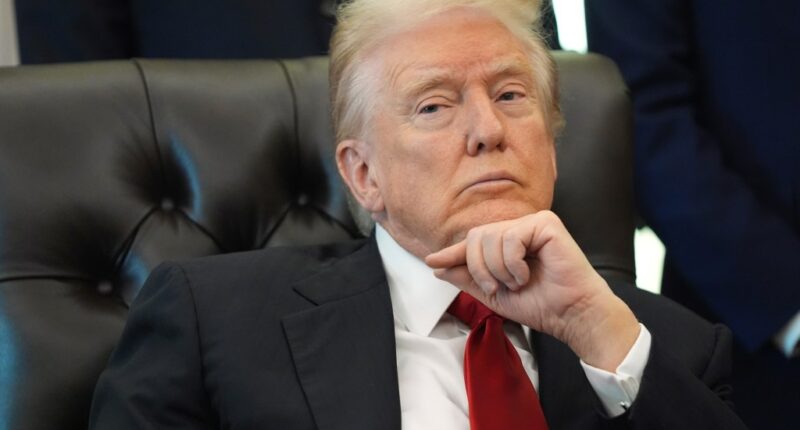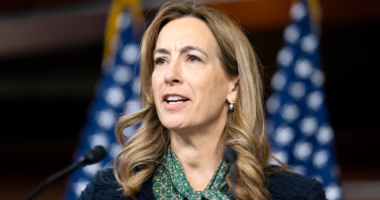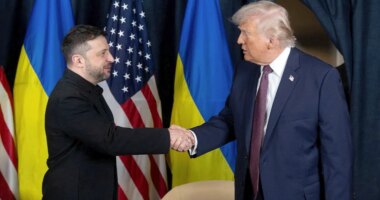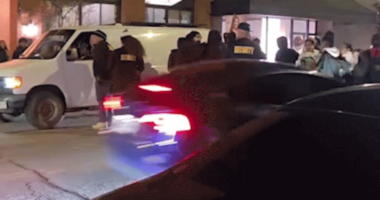Share this @internewscast.com

President Donald Trump has stirred the political pot by labeling New York’s newly elected mayor, Zohran Mamdani, as a “communist.” Trump, a former New Yorker now residing in Florida, further suggested that Miami could serve as a sanctuary for those escaping New York City’s alleged communist threat.
This provocative statement raises a pertinent question for Florida: Will its educational institutions permit an open dialogue about whether Mamdani truly embodies communist ideals? If the answer is no, it challenges Florida’s commitment to upholding the freedom it claims to cherish.
Last year, Florida enacted legislation mandating that schools educate students on the “evils and dangers of communism.” Subsequently, the U.S. House of Representatives passed a bill aimed at equipping schools nationwide with resources to illustrate communism as “contrary to the founding principles of freedom and democracy in the United States.”
This bill is now awaiting deliberation in the Senate. Florida Senator Rick Scott, a Republican, has made the intent behind the legislation abundantly clear. He asserted that for decades, the left has endeavored to promote socialist and communist ideologies, which conflict with the values championed by the Republican party and President Trump. Schools, according to Scott, need to counteract this perceived radical propaganda by instilling in children the freedom and principles that define America.
If this rhetoric echoes the sentiments of the Cold War era, it is because it mirrors that period’s ideological battles. A nation confident in the power of free thought would not dictate what its citizens should believe.
Yet history reminds us that during the Cold War, the U.S. engaged in similar tactics. In the effort to combat communist ideology, schools were used to propagate a particular narrative, often stifling the very open discourse that democracy thrives upon.
The first step was to make sure teachers were on the right side. After World War II, dozens of states passed measures requiring teachers to take loyalty oaths. In Vermont, teachers had to forswear any “instruction, propaganda, or activity” that was “contrary to or subversive of the Constitution and laws of the United States.” But as one teacher asked, would that prevent a teacher from, say, criticizing the repeal of national alcohol prohibition?
Nobody knew, so the safest move was to keep quiet. “School teachers are like the Sphinx,” a Washington Post columnist wrote in 1950. “They seldom express their views.” That was especially true for the Soviet Union and communism, which became tabooed topics in the classroom. Teachers referred to the American Revolution as the War of Independence, lest they conjure communist revolt. And one teacher was reprimanded for telling her class — accurately — that the Soviet Union had a larger land mass than the U.S. did.
The silence around the subject started to lift after the Soviets launched their Sputnik satellite in 1957, which made Americans worry that the enemy’s technical prowess might lure children into its camp. So states began to require school units or courses about communism.
Louisiana’s law mandated instruction about the “evils of socialism” and “the strategy and tactics used by communists in their efforts to achieve their ultimate goal of world domination.” And in 1961, Florida required that every student receive 30 hours of teaching about “the dangers of communism, the ways to fight communism, the evils of communism, the fallacies of communism, and the false doctrines of communism.”
Fast-forward to Florida today, where — under a proposed set of state social studies standards — students will learn that communist governments engaged in “suppression of freedoms” and built a “cult of personality” around their leaders. They will also study how communists “utilize crises (real and manufactured) to rally support for the regime.”
That’s all true, and our students should know it. And it brings us back to Zohran Mamdani, whom Trump and other Republicans have denounced as a communist. There’s no evidence that Mamdami wants to overthrow democratic government and replace it with a dictatorship of the proletariat, which the Florida standards correctly identify as a distinguishing feature of communism.
But there is evidence that Donald Trump has suppressed freedoms, by deporting student protesters and harassing his political enemies. He has invoked false crises to send troops into American cities and to kill foreign civilians in international waters. And he has built a cult of personality around himself, holding a military parade on his birthday and placing his face on a coin.
I would welcome a full discussion of these matters in American classrooms. But that’s exactly what Trump and his apologists are trying to prevent. In the name of freedom, they are suppressing it. We’ve seen this act before.
Zimmerman teaches education and history at the University of Pennsylvania and serves on the advisory board of the Albert Lepage Center for History in the Public Interest.
















